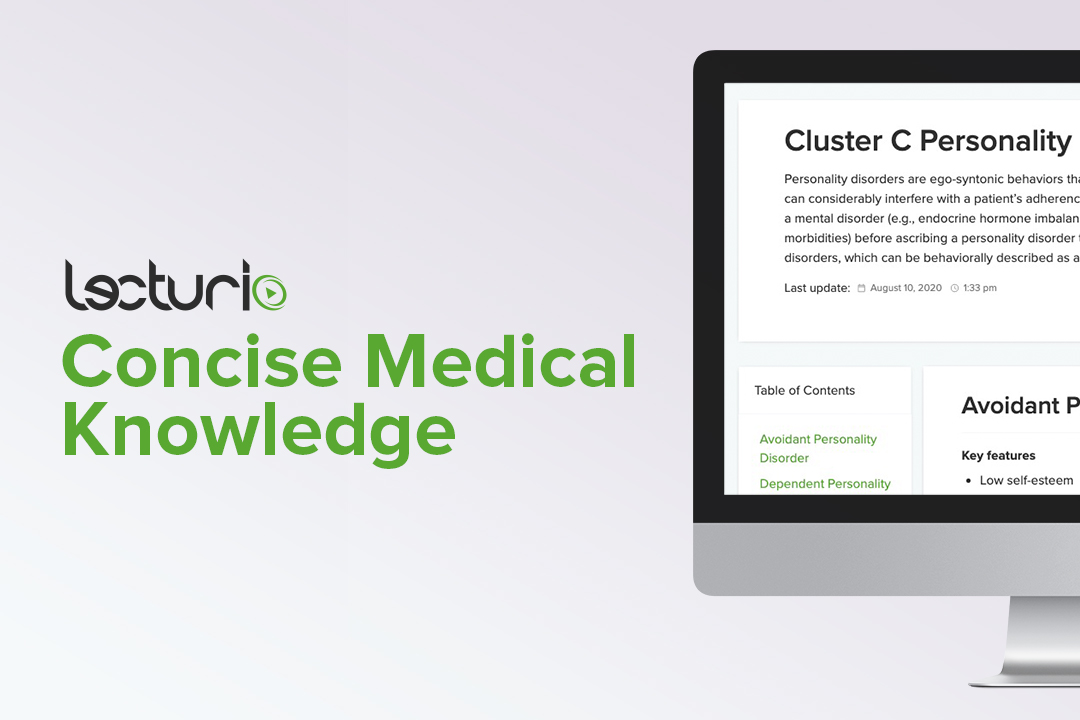Playlist
Show Playlist
Hide Playlist
Cluster C Personality Disorders
-
Slides ClusterC Psychiatry.pdf
-
Download Lecture Overview
00:01 Now, let's look at cluster C personality disorders in more detail. 00:06 Starting with the avoidant personality, this is a pervasive pattern of social inhibition, feelings of inadequacy and hypersensitivity to negative evaluation, beginning by early adulthood and present in a variety of contacts. 00:23 Patients will meet four or more of the following criteria, avoiding occupational activities that involve significant interpersonal contact, because they fear criticism, disapproval or rejection. 00:38 The need of guarantee of being liked before getting involve with others, showing resistance when intimate relationships start to form because of fear of being shamed or ridiculed. 00:53 They're preoccupied with being criticized or rejected. 00:56 They feel inhibited in new interpersonal situations because they fear inadequacy and they view themselves as socially inept, personally unappealing or inferior to others. 01:09 These people are unusually reluctant to take personal risks or engage in any kind of a new activity because they fear being embarrassed. 01:20 The differential diagnosis includes social phobia. 01:24 This occurs equally amongst men and women, and they are able to function in relationships, provided, however, that they feel very safe and accepted in that relationship. 01:37 The treatment really relies on creating that safe environment so the person free from ridicule, medications are seldom used but sometimes anxiolytics can be helpful such as Benzodiazepine and possibly SSRI or anti-depressants. 01:57 The dependent personality disorder is as follows. 02:01 A pervasive and excessive need to be taking care of that leads to submissive and clinging behavior and fears of separation, beginning by early adulthood and persisting in a variety of contacts. 02:16 The patient will meet five or more of the following criteria. 02:20 They have difficulty making everyday decisions without an excessive amount of advice or reassurance from others. 02:29 They need others to assume responsibility for most major areas of their lives. 02:34 They have difficulty expressing disagreement with others because of fear of loss of support. 02:40 They have difficulty initiating projects or doing things on his or her own time. 02:46 And they go to excessive lengths to obtain nurturance and support from others. 02:53 They often feel uncomfortable or helpless when alone because of exaggerated fears of being unable to care for themselves. 03:03 They urgently seek out another relationship as a source of care and support when one relationship ends. 03:10 And they are unrealistically preoccupied with fears of being left to take care of themselves. 03:18 Females are more commonly affected than males with dependent personality, and patients with a history of childhood separation anxiety or chronic illness might be predisposed to this type of personality disorder. 03:32 The co-morbidities include dysthymia, major depression, and alcohol use disorder. 03:38 The dependent personality disorder treatment includes individual psychotherapy and also group therapy. 03:46 Medications might be intermittently effective and usually are in the form of SSRIs or antidepressants at low doses. 03:55 The final cluster C personality disorder is obsessive compulsive personality. 04:01 This is a pervasive pattern of preoccupation with orderliness, perfectionism and mental and interpersonal control at the expense of flexibility, openness, and efficiency. 04:13 Beginning by early adulthood, and present in a variety of contacts. 04:19 There are four or more criteria that are met as follows. 04:23 The individual is preoccupied with details, rules, list, order, organization. 04:29 They show perfectionism that interferes with task completion. 04:35 They are excessively devoted to work and productivity to the exclusion of leisure activities and they are over-conscientious, scrupulous and inflexible about matters of morality, ethics, and values. 04:50 This patient is unable to discard worn-out or worthless objects even when they have no sentimental value. 04:58 They are reluctant to delegate tasks or to work with others, unless they submit to exactly his or her own way of doing things. 05:07 And they adopt a miserly spending style, where they are extremely for goal. 05:12 They show rigidity and stubbornness. 05:15 This is more common in males, increased concordance in identical twins, and it tends to run in families. The co-morbidities of OCPD include depression, somatoform disorders, and alcohol abuse. 05:31 The treatment is hopeful, individuals often have good insight into the impact of their behavior and tend to seek out treatment. 05:39 Psychodynamic in group therapy can be very helpful in these cases. 05:44 And cognitive behavioral therapy can be used to help modifies specific behaviors such as impulse control, frustration tolerance and impaired cognition with strategies. 05:57 Let's go through a quiz now using a few case examples. 06:01 Consider this, a 26-year-old woman lives at home with her parents. 06:06 She graduated college but has opted not to look for a job and rather clings to her parents for financial and emotional support. 06:15 She tends to be submissive in a relationships and does not assert for own needs out of fear that any expression of anger will result in her being rejected. 06:26 What personality disorder do you think she has? Well, she has a dependent personality disorder. 06:33 And your clues are that she clings to her parents, is submissive and non-assertive. 06:40 How about this case, Jim is a 32-year-old single man who has a successful career and interest in a social life including marriage and children someday. 06:52 But he feels stuck because he tends to decline invitations out to eat with friends and opts to have lunch alone in his office rather than in the cafeteria where he might actually meet someone. 07:03 He describes himself as shy and afraid of embarrassing himself in front of others. 07:08 What personality disorder do you think he has? He has an avoidant personality disorder. 07:16 And you know this because he's alone and shy. 07:20 A student is very fastidious about wanting things a certain way, to the point of inflexibility. 07:25 He takes meticulous notes, highlights vigorously and files his notes in an organized fashion. However, his need for order and perfection makes the process excessively time-consuming and inefficient. 07:39 He often spends hours organizing and re-organizing his materials, often at the expense of actual studying or engaging in social activities. 07:48 People often tell him, “You’re OCD,” But these behaviors do not upset him, they keep him organized and he feels good about that. 07:56 So what personality disorder do you think he has? What i've just described is an obsessive-compulsive personality disorder. 08:06 And your diagnostic clues are that he's meticulous and organized at the expense of flexibility and efficiency.
About the Lecture
The lecture Cluster C Personality Disorders by Helen Farrell, MD is from the course Personality Disorders. It contains the following chapters:
- Cluster C
- Assessment – Dependent Personality
- Assessment – OCP
Included Quiz Questions
Which of the following is a pervasive pattern of social inhibition, feelings of inadequacy, and hypersensitivity to negative evaluation, beginning by early adulthood and present in a variety of contexts?
- Avoidant personality disorder
- Obsessive compulsive disorder
- Paranoid disorder
- Borderline disorder
- Schizoid disorder
Which of the following disorders is defined as "a pervasive and excessive need to be taken care of that leads to submissive and clinging behavior and fear of separation, beginning by early adulthood and present in a variety of contexts"?
- Dependent personality disorder
- Obsessive-compulsive personality disorder
- Histrionic personality disorder
- Avoidant personality disorder
- Borderline personality disorder
Which childhood condition predisposes for dependent personality?
- Childhood separation anxiety
- Attention dependent hyperactivity disorder
- Antisocial behavior
- Conduct disorder
- Childhood autistic disorder
Which of the following is NOT a diagnostic criterion of obsessive-compulsive personality disorder?
- A grandiose sense of self-importance
- Shows perfectionism that interferes with task completion
- Is unable to discard worn-out or worthless objects even when they have no sentimental value
- They are reluctant to delegate tasks or work with others
- Shows rigidity and stubbornness
Which of the following is a comorbidity of obsessive-compulsive personality disorder?
- Depression
- ADHD
- Post-traumatic stress disorder
- Cocaine use
- Bipolar disorder
Customer reviews
5,0 of 5 stars
| 5 Stars |
|
2 |
| 4 Stars |
|
0 |
| 3 Stars |
|
0 |
| 2 Stars |
|
0 |
| 1 Star |
|
0 |
The disorders are well explained, the examples help to understand more easily and the therapeutic approach for these patients is useful
Explicit explanation and very well presented Short and concise and I really loved the questions which made the disorders more easy to grasp.




